It is clear that the fifth (and final, if Harrison Ford and Lucasfilm are to be believed) Indiana Jones serial intends to be a “return to form” right from the opening credits—which pointedly use the exact same font as the opening credits of 1981’s Raiders of the Lost Ark. (The irony of trying this move when the very first sight in the film is Disney’s 100th anniversary logo cannot be overstated.) This would seem to be a bit of wishful thinking on the part of director/co-writer James Mangold, the man who Hollywood has decided should be the go-to for aging heroes and their final chapters, after his success with X-Men’s Logan.
Dial of Destiny is by no means a return to form. It’s only half of a good movie, in fact. But that half, funny enough, is still lingering in my mind.
[Some spoilers for Indiana Jones and the Dial of Destiny]
The amount of time the production spent trying to assure audiences that Ford’s CGI’d de-aging would be seamless during the film’s half-hour (half-an-entire-damn-hour for some reason) 1944 opening sequence… should have been our first clue that it would be the opposite. The technology has certainly stepped up—something I’m not in favor of regardless, on both ethical and creative fronts—but it’s still deeply imperfect, often uncanny, and badly grafted at key angles. This makes the overlong start to the film muddy in all the places where it needs to be sharp, specifically the action itself, which is often too dark to parse (an increasingly common issue in modern cinema), too fast to follow, and too packed to make an impression.
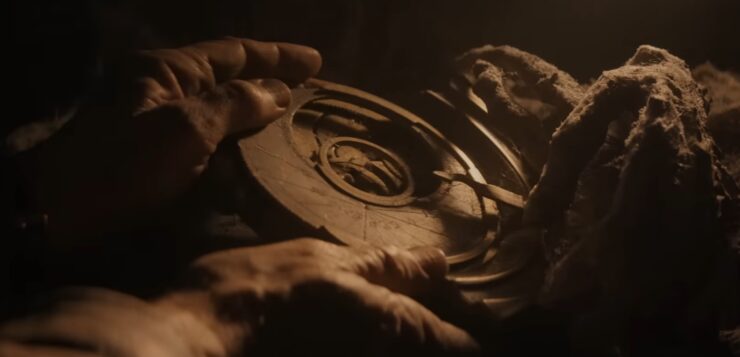
While the whole segment could have easily been cut down to half the time or less, it offers up our relevant Macguffin for the journey: the antikythera, or Archimedes’s Dial, an ancient device that can supposedly detect fissures in time. This makes it of particular interest to Jürgen Voller (Mads Mikkelsen), a Nazi mathematician who hates Hitler for losing their war—because he could see all the errors all too clearly, and knew how to win. Luckily, Indy and his pal Basil Shaw (Toby Jones) make it out with the half of the dial uncovered by Voller. Unluckily, Basil’s possession of the artifact drives him to obsession and mania, and then a premature death.
He leaves behind a daughter named Helena (Phoebe Waller-Bridge), who shows up at Jones’ doorstep on the eve of his retirement—which is also Moon Landing Day—to get the dial half Indy eventually wrested from her father for his protection. But Voller has been working in the U.S. under the auspices of Operation Paperclip, and is also seeking what Jones stole out from under him twenty-five years ago. Helena’s motives are also far from familial and fond despite being Indy’s goddaughter; turns out that she wants the dial to sell it at auction in Tangier, having fallen into a somewhat murky lifestyle following her father’s death.
The racism that is unfortunately a hallmark of the series remains intact, even in its attempts to do better. While a scene where Indy cracks a whip in a Tangier hotel and is met with a dozen guns—a clear jibe at his own dispatch of the skilled swordsman in Egypt during Raiders—is meant to show that filmmakers have perhaps learned a lesson or two, it doesn’t change the fact that the very first shot of people in the city is a local woman being sexually harassed by a local man in a sweeping shot across said hotel. Nor does it make up for the film offering us Shaunette Renée Wilson’s excellent turn as government agent Mason, only to cruelly discharge her from the narrative because… I guess we needed another reminder that Nazis are evil?
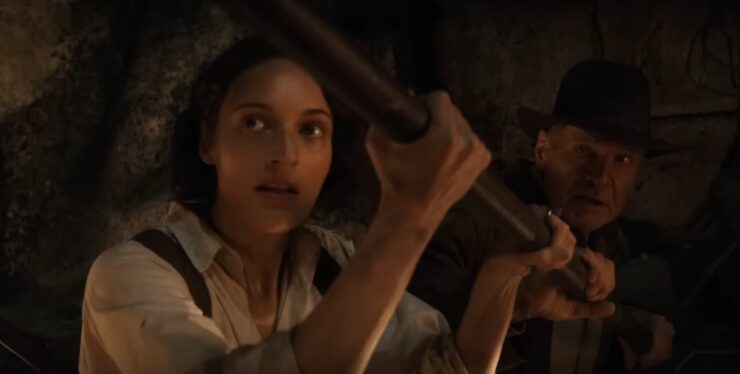
There are a few other moments of correction, like the whip in the hotel—an awareness that runs through the film about past slights or common themes that should be addressed. There’s a moment where Helena and Indy get covered in bugs, much like poor Willie in Temple of Doom, and the film goes out of its way to show them both panicking to a very vocal degree, thereby retroactively rendering Willie’s screams as anything but an overreaction. (Which, they never were, for the record.) There’s a moment where Indy asks Helena why she would chase down the thing that drove her father mad, and she stares him in the face and asks “Wouldn’t you?” because this is a series about the obsessions and knowledge and life pursuits we inherit, and how they shape us. There’s also the relationship between Helena and her literal partner-in-crime Teddy Kumar (Ethann Isidore), a clear harkening to Indy’s relationship with Short Round (the duos even met the same way), but unlike Shorty’s disappointing evaporation from the series, it’s clear that Teddy will be folded into Helena’s life for the long-haul by the end.
Buy the Book
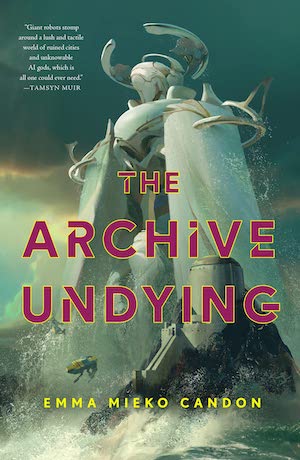

The Archive Undying
There are plotholes aplenty in this one, so if you’re hoping for sense (or even sensibility), consider this fair warning. The CGI genuinely does drag the film down at key moments when emotion is running highest, and it’s something that Hollywood needs to pay attention to and reconsider heavily in the future. There’s a particular conversation toward the end of the movie that takes place on a beach, and the background is so clearly manufactured that it renders everyone’s hair blurry, the lighting a sad mockery of true daylight. It’s frustrating to be watching an effort that took nearly three-hundred million dollars to put in front of an audience, and be sitting there thinking why couldn’t you have just put these people on a real beach? when you’re meant to be invested in the character’s emotions.
There’s an argument to be made, too, about how we frame action sequences as actors age. Jones is supposed to be a pretty wily guy who’s mostly clever to win his fights, despite being able to take a punch, yet he’s seventy years old here (and Ford is eighty). There are moments where the film allows this to be true, to watch him struggle when attempting to wrestle with Voller’s muscle (Olivier Richters), knowing that he can’t take a man that large at his age, even if he had the time to be clever. But because Ford insists on playing to realism in those moments, it changes the nature of the blows—it’s not “fun” to watch an elderly man get punched in the face. And he does, repeatedly. And if the film had been a little smarter, it might have really used that, made something of our love for carnage when we don’t perceive the person taking the hits to have any real-world frailties. Indiana Jones does, and it’s not going to feel the same now when someone socks him on the jaw.
Having said all this, there are many places in this film that truly do “get” this character beyond his sordid grave robbing moniker and the colonialist baggage it rightly brings. Because at his core, Indiana Jones is plainly just… a history nerd. That is what matters to him, what he cleaves to. His catchphrase of “That belongs in a museum!” (which makes another appearance here) is always made in direct reference to people who are stealing artifacts for profit, to put in the hands of private collectors. Despite the blindspots of this cry, to him, it is ultimately a call for history to be treated with the collective respect it is owed, and shared as widely as possible. The day of his retirement is flooded with New Yorkers of every stripe ignoring him in favor of the moon landing, and while that’s hardly surprising, you can see in Ford’s expression precisely what Indy is thinking of all this: How heartbreaking that everyone is looking to the stars when what we’ve got right here on our own planet is infinitely fascinating, complex, and worthy of awe.
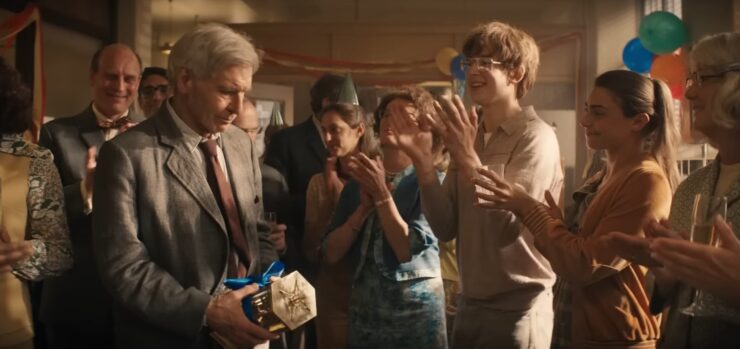
Strangely, that’s a thought we could all stand to internalize right now.
There’s also an acknowledgment of the enduring affability of Indiana Jones, being his propensity for gathering friends to him like an ungainly pile of lucky charms wherever he goes. The film builds on this ever-expanding cadre of friends all over the globe: We see Sallah (John Rhys-Davies) again, whose family Indy helped bring to America during the war to keep them safe; we learn about Basil; and we meet Renaldo (Antonio Banderas), a diver in Greece who helps them retrieve the next piece of the dial’s puzzle. We watch Indy renew his relationship with Helena, and find that he’s somehow able to bring out the best in both her and Teddy. And we learn what breaks that seeming superpower; his separation from Marion Ravenwood is a sore spot throughout the film, and there are painful reasons in it that he is barely able to speak of.
Given the recent slate of films on the subject of heroes giving their last hurrahs, we would obviously expect the same ending for Jones—only to have the film violently oppose that idea. After Professor X and Logan, after James Bond, after Tony Stark, and so many others doing the so-called noble thing and leaving behind families and friends again and again because heroism is about great deeds at all costs and certainly not about growing old with the ones you love, the Dial of Destiny roundly says… no.
No, that’s not good enough. No, that’s not the point of having a life. No, that’s not what we want for this grumpy old nerd who just wants someone to read and annotate ancient texts with until he dies. Helena is a wonderful character in her own right, but she becomes something of an audience stand-in at that moment, giving Indy the answer we might offer: You are here for the people who love you. There are far too many of us for you to pack it in. (She couches it in protests against temporal paradoxes, though, which is right smart of her.)
Okay, so the first half enraged me, but the ending did make me cry. As a send-off, I can’t ask for much more than that, I suppose. And we did get one more John Williams score out of it.
Emmet Asher-Perrin thinks a lot about the number of archaeologists who caught the obsession from Indy directly, and thinks that’s a perfectly good legacy, when all is said and done. You can bug them on Twitter and read more of their work here and elsewhere.










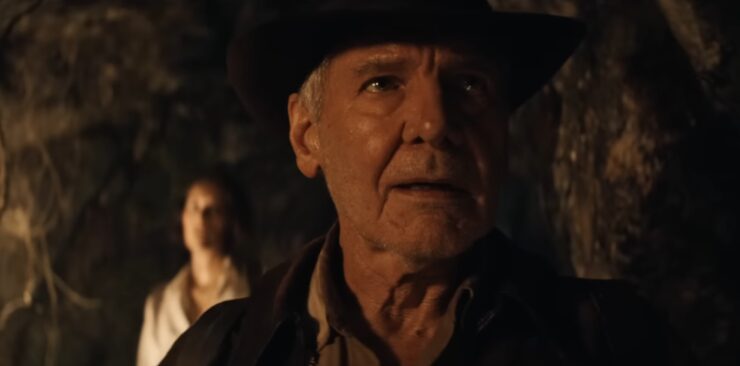
A lot I agree with here, but especially what happened to Mason. I had already been imaging a spin-off series of movies with her.
A lot I agree with here, but especially what happened to Mason. I had already been imagining a spin-off series of movies with her.
Sounds like I will enjoy it. I observe that in the trailers, Indy says something like, “I’ve been looking for this for my entire career.” I have to wonder how many other things he can say that about.
“How heartbreaking that everyone is looking to the stars when what we’ve got right here on our own planet is infinitely fascinating, complex, and worthy of awe.”
No. NO NONONO *NO*
The heartbreak would be if no one was looking to the stars. Yes, there is much that is fascinating on Earth (although there could be some argument about “our own planet”) but there is infinite sadness when you give up looking to the stars.
Great observations. You’re totally right about Shaunette Renée Wilson. She has a great presence and seemed on the verge of becoming a great character. Then boom: gone. And, at long last, justice for Willie Scott! How can anyone give her crap for being scared out of her mind by infinite slimy things? We *all* would be. And she *still* carried on and saved Indy and Short Round. I don’t know if that’s bravery or perseverance or what. But whatever it is, it’s awesome and admirable.
I agree about the darkness and too fast pacing of the action. Its the single biggest issue I had with the film, and it’s a sadly common issue I notice in a lot of films of late. I also agree with your thoughts about the ending, which I felt was perfect for the character.
I do disagree about the de-aging though, at least in part. I was actually surprised by how well it worked. Its certainly not perfect, and there are some uncanny bits. Facial expressions still don’t look entirely natural, but this is probably the most convincing implementation of the technology I’ve seen so far. The dark, frantic action of that scene was much more of a distraction for me than the de-aging- though I’ll concede that the lighting and pacing may have been driven by desire to keep the de-aged face from lingering too long in frame, lest the audience find themselves too deep in the uncanny valley. On the artistic/ethical front, I tend to think the technology should be used judiciously, and that justifications need to be made on a use-by-use basis. I think this film clears those hurdles for me.
Overall, despite the film’s flaws, I had a really fun time watching it. I wasn’t expecting anything on the level of the first three (which are high on my list of all-time favorite films). My benchmark for success for this film had 2 criteria: Is is better than Crystal Skull, and as a finale, did the emotional beats resonate? And I think I can confidently say yes to both.
I liked this movie quite a lot. My only real qualm with it was, yes, the repeated gunning down of good guys and innocent people to prove how evil the Nazis were. By the time they pulled the trigger on Captain Puss N. Boots, I said to myself, ‘Okay! They’re evil! We get it!’
Other than that, I had a great time.
A very unpopular opinion, watching from india( am a lower caste transwoman from andheri slum) where i spend around rs 350( 4$) of my weekly earning rs 2750( 30$) to watch this movie because I had seen the first 3 movies so many times and loved the magic and enchantment indiana jones gave to my dreary existance. Dial of destiny was a horrible even more horrible than crystal skull, because of what they did to indie. My indi is a great charming man who brings a gun to a sword fight. Not the man who gets constantly beaten up by a totally unlikable character. The ending is such a disrespectful ending. I would have been more happy if he had sacrificed himself for saving the humanity instead of being suicidal. I dont think my comment will be published still i hope the moderators will convey my seething disgust to the writer of this essay
“And we did get one more John Williams score out of it.” – okay, so I haven’t actually seen the movie yet (although this review does at least make me think it will have some charm when I eventually catch it on streaming), but this to me has been the only justification so far for it, haha :) That is the one thing I am really looking forward to!
I have to commend the one henchman whose response to every. single. situation. was to shoot somebody. No matter if it was an appropriate response, no matter if it caused more problems than it solved, you can be sure he’s going to pull the trigger. Guy has one move, it works for him at least some of the time, and he’s going to stick with it no matter what. That’s dedication!
I appreciated how Indiana interrupted the victory moment to remind his god-daughter that he just saw his friend Renaldo killed in front of him. It felt like a response to every other movie that just glosses over events like that and gets on with the next action bit. Also liked how the smallest hero was responsible for taking down the largest villain.
I disagree with a few points.
The woman accosted outside the hotel wasn’t about sexual harassment or racism, but instead an establishment of the character of the hotel and the people they were meeting within. These aren’t villains in the sense of the charming Donovon or Elsa, these are rough people in a rough part of the world.
I agree that the core of Indy is a History Nerd, and the exploration of what that means in a world that is now constantly and overwhelmingly looking to the future can be interesting – but not when you have a young upstart showing him up by explaining everything throughout the movie. It robs the final message (you still have something to offer people). More of the explanation throughout the movie would have been better with the earnest Indy we get when talking about the Staff of Ra or finding out that X marks the spot.
Additionally the death of the CIA agent is an important story beat because it separates out that the villains no longer need support to complete their objective and are no longer willing to hide who they are and what they are working towards. I would have enjoyed seeing her paired with Indy and the party, but I think that moment was much more significant than just showing us again that the Nazis were evil.
Overall I enjoyed the movie significantly more than I expected to, and I enjoyed the ending (and also cried) and thought it was a fitting end for the series, if it ends up being the end.
It’s not moon landing day, tho. It’s the day the returned astronauts parade thru town. The parade is a big feature of a set piece, as is the moment Indy rides past the astronauts on the horse…
Just got back from the theater with my wife. Both of us liked it better than Temple of Doom and Crystal Skull. Both of us disliked Helena, even though she softened toward the end. Both of us thought the action scenes were overly frenetic at times. And both of us liked the ending. But my wife ended up disliking the movie, while I enjoyed it. I think it helped that I knew more of the history that was being discussed. And being a science fiction fan, I enjoyed the rather audacious twist in the third reel, which left my wife cold.
The audience definitely skewed older, which might have had something to do with Wednesday senior discounts, but I have heard the film did not bring younger viewers to the theaters.
In the past weeks, to get in the mood for the movie, I was watching the Young Indiana Jones series on Disney Plus. That series never got the attention it deserved, and is well worth the time of anyone who still wants to see more of Indy.
Against all odds, I ended up loving this movie. My only problems are with the complete absence of Short round (I mean, a small cameo at the end, coming home with noodles to berate Indy because he didn’t ever call him for help?) and with unsatisfactory end of the shooting nazi (if someone is so evil, he deserves to die an appropriate death).
I don’t get all the criticism about racism etc, it is a fairy tale set in the ‘60… you have to roll with the character.
Another secret wish… I would have had Indy lose an eye in the final fight, to get on par with the ‘old Indie’ of the TV series
Really agree with Alan Brown Comment 16 on Young Indiana Jones. It’s great fun. I’ve seen some of the book-ends of old Indi telling people his stories which have now been taken out of them and I prefer to think of him having that experience of passing on his stories becoming a part of history and inspiring others instead of only studying it.